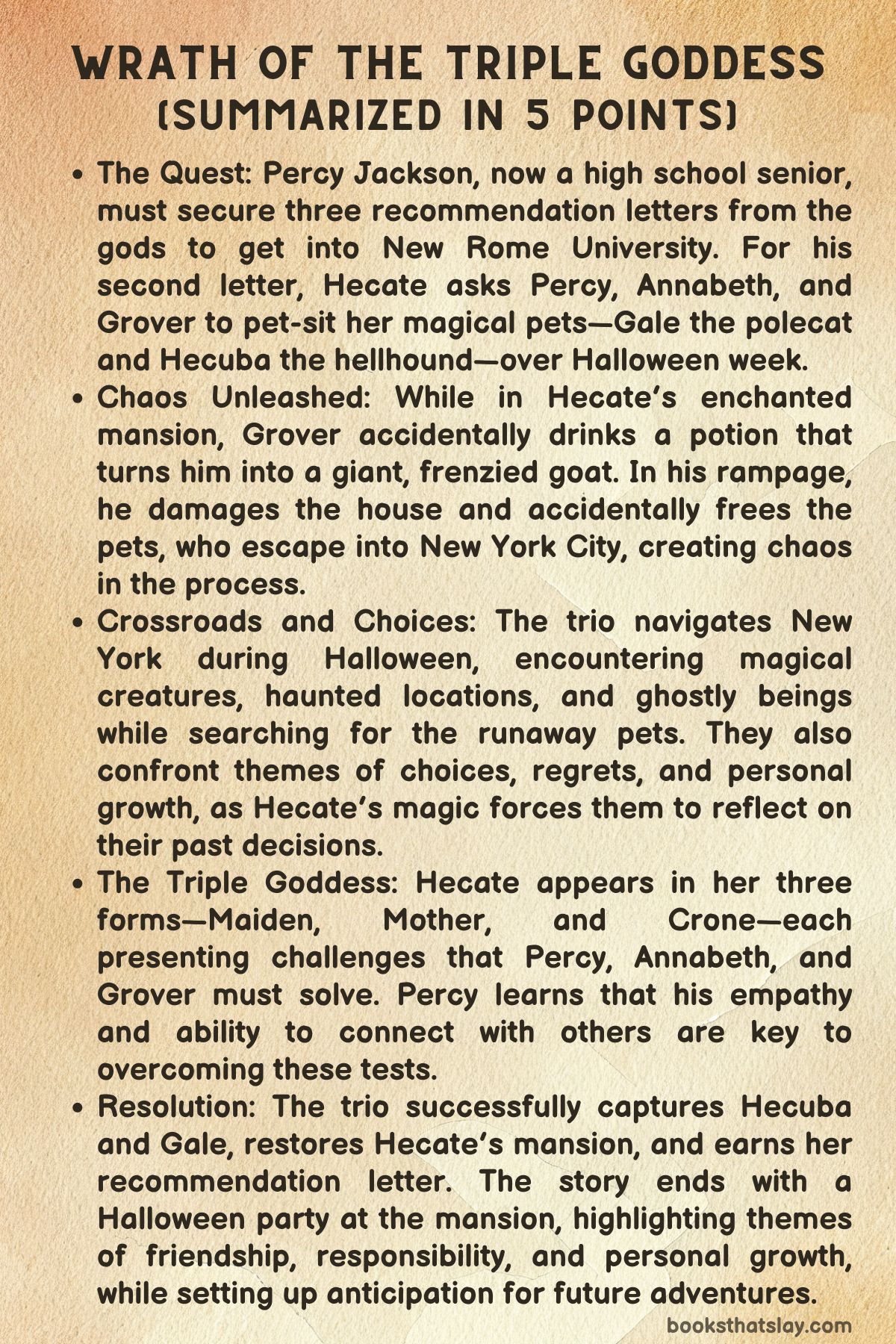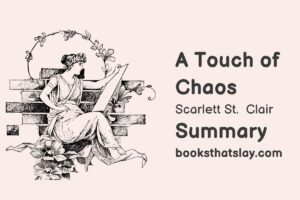Wrath of the Triple Goddess Summary, Characters and Themes
“Wrath of the Triple Goddess” by Rick Riordan is a light-hearted, humor-filled continuation of Percy Jackson’s journey as he prepares for college.
Now a high school senior, Percy must secure recommendation letters from the gods to get into New Rome University. This time, the task comes from Hecate, the goddess of magic, who entrusts him, Annabeth, and Grover with pet-sitting her two mischievous magical animals during Halloween week. What seems like a simple task quickly spirals into chaos, involving enchanted houses, runaway pets, and lessons on choices, regrets, and responsibility, all delivered with Rick Riordan’s signature wit and heart.
Summary
Percy Jackson, now a senior in high school, is on a mission to secure three recommendation letters from Greek gods to gain admission to New Rome University. Having completed one quest, his second task comes from Hecate, the goddess of magic and crossroads.
Her request seems simple: Percy, Annabeth, and Grover must pet-sit her two magical creatures—Hecuba, a hellhound, and Gale, a polecat—while she is away for a week during Halloween. However, in the world of demigods, nothing ever stays simple.
The trio arrives at Hecate’s mansion, an enchanted and seemingly endless house filled with magical artifacts, potions, and secrets.
The goddess warns them not to touch anything. Initially, Percy believes the quest will be an easy one, but the mansion’s eerie atmosphere and the pets’ wild behavior soon prove otherwise. Gale is mischievous, causing magical accidents around the house, while Hecuba, though loyal, is unpredictable and chaotic.
Things take a turn for the worse when Grover, unable to resist the temptation, drinks a strawberry-flavored potion from Hecate’s lab. The potion transforms him into a giant, frenzied goat.
In his rampage, Grover wreaks havoc throughout the house, accidentally releasing Hecuba and Gale into New York City. The trio is left with two major problems: repairing the magical damage in Hecate’s mansion and finding the runaway pets before Hecate returns.
As Percy, Annabeth, and Grover search the city for the escaped animals, they encounter various mythological creatures and Halloween-themed magical occurrences. Their adventures are filled with humorous mishaps, including dealing with ghostly spirits, enchanted objects, and other demigods celebrating the spooky season.
Along the way, Percy is confronted with choices that force him to reflect on his past decisions and regrets, a central theme tied to Hecate’s domain over crossroads and fate.
Throughout their quest, Percy continues to rely on Annabeth’s intelligence and quick thinking. Their bond grows stronger as they face challenges together, sharing moments of romantic tension and unwavering support. Grover, meanwhile, struggles with feelings of insecurity, believing he’s a burden to his friends.
However, he proves his worth by unlocking a new satyr ability called “grounding,” which allows him to communicate with nature through the earth. His newfound power plays a crucial role in helping them locate the missing pets.
The climax of the story occurs when the trio finally tracks down Hecuba and Gale. They face a magical battle involving spirits and ancient forces tied to Hecate’s magic. Percy’s new ability to use Riptide as a pen to write invisible magical messages becomes crucial in overcoming the final obstacle.
The resolution highlights Percy’s empathy and kindness, which remain his greatest strengths.
In the end, Percy and his friends successfully complete the quest, repairing Hecate’s mansion and returning the pets safely. Hecate, pleased with their efforts, grants Percy his second recommendation letter.
The trio reflects on the choices they’ve made and how their experiences have shaped them. While the quest wasn’t as world-threatening as their previous adventures, it reinforces the importance of friendship, responsibility, and personal growth.
“Wrath of the Triple Goddess” concludes with a celebratory Halloween party at Hecate’s mansion, leaving readers anticipating future quests and more light-hearted adventures in Percy’s journey to New Rome University.

Characters
Percy Jackson
Percy Jackson is the protagonist of “Wrath of the Triple Goddess” and is the character who drives the narrative. As a high school senior, Percy is caught between his responsibilities as a demigod and his desire to secure a future beyond the world of Greek mythology.
His main objective in this story is to obtain a recommendation letter from Hecate, the goddess of magic, to help him get into New Rome University. Percy’s growth throughout the book reflects the internal struggles he faces as he moves closer to adulthood.
His signature self-deprecating humor is ever-present, offering moments of levity amidst the chaos. Despite his humor, Percy is deeply empathetic, which continues to distinguish him from other characters.
This trait is especially evident when he goes out of his way to help others, whether they are mortals, magical creatures, or even his close friends. As a character, Percy also continues to demonstrate a growing sense of responsibility and maturity.
However, his anxiety about his future, particularly when facing crossroads moments, showcases his vulnerability. He often reflects on his past decisions and the weight of his choices, which is a significant theme in this book.
Annabeth Chase
Annabeth Chase is Percy’s brilliant girlfriend and an essential part of the trio of protagonists. She plays a crucial role in the adventure, offering wisdom, strategy, and a steadying presence whenever things get out of control.
Annabeth’s intelligence continues to shine in this story, as she helps the group navigate the many magical challenges within Hecate’s mansion and the larger quest of locating the runaway pets. As a character, Annabeth is highly resourceful, and her problem-solving abilities often save Percy and Grover from tricky situations.
She is also the voice of reason in the group, especially when Percy’s impulsiveness leads them into trouble. Her relationship with Percy has matured, and it’s clear that they are not only partners in the quest but also in life, as they continue to grow closer throughout the book.
Annabeth’s character also highlights themes of responsibility and choice. She stands by Percy not just because of their romantic bond but because she understands that their journeys are intertwined.
Annabeth’s quiet wisdom and unwavering loyalty add depth to her role, and she remains an integral part of the trio’s success.
Grover Underwood
Grover Underwood, Percy’s loyal satyr friend, adds both comic relief and emotional depth to the story. He is a key part of the trio, bringing his unique abilities and perspective as a nature spirit.
In “Wrath of the Triple Goddess,” Grover inadvertently causes much of the chaos when he drinks a strawberry-flavored potion in Hecate’s laboratory, turning into a giant, frenzied goat. This mishap leads to the release of Hecate’s pets, setting off the main conflict of the story.
Despite this, Grover’s character is not defined by his mistakes. Instead, his loyalty to Percy and Annabeth shines through, and he proves to be an invaluable companion throughout the quest.
Grover also experiences personal growth in this story, particularly when he unlocks a new ability called “grounding,” which allows him to communicate with nature through the dirt. This development symbolizes Grover’s increasing connection to the natural world and his growing sense of self-worth.
While he still struggles with feeling like the third wheel in Percy and Annabeth’s relationship, Grover is a steadfast and supportive friend. He often provides the emotional backbone the group needs to stay focused and determined.
Hecate
Hecate, the goddess of magic, necromancy, and crossroads, plays a pivotal role in the plot of “Wrath of the Triple Goddess.” She is the one who offers Percy the second recommendation letter he needs for college, but only if he agrees to pet-sit her magical animals, Gale the polecat and Hecuba the hellhound, while she’s away.
Hecate’s character is defined by her connection to magic and the supernatural, which permeates much of the story. Throughout the book, she manifests in her three forms: Maiden, Mother, and Crone, each representing different aspects of choices and consequences.
Hecate’s manifestations are not merely for dramatic effect; they serve as a means of testing Percy, Annabeth, and Grover, forcing them to confront their past decisions and learn from them. Her relationship with the trio is somewhat distant, but it is clear that she sees value in testing them and providing guidance.
Hecate’s presence in the story challenges Percy and his friends to reflect on the importance of choice, responsibility, and self-growth, making her a key figure in their development. Though her role in the narrative is more enigmatic, her influence over the events is undeniable.
Her three forms underscore the book’s central themes of crossroads and the consequences of decisions.
Gale and Hecuba
Gale the polecat and Hecuba the hellhound are central to the chaos in “Wrath of the Triple Goddess.” These two magical pets, under Hecate’s care, create significant problems for Percy, Annabeth, and Grover.
Gale, the mischievous polecat, is known for his ability to disappear, fart, and create magical accidents, adding a layer of unpredictable comedy to the story. His behavior often leads to moments of frustration and confusion, but also acts as a catalyst for some of the book’s more humorous moments.
On the other hand, Hecuba the hellhound, although loyal, is unruly and prone to causing destruction. She runs away from the mansion and marks her territory around New York City, complicating the trio’s mission even further.
While the pets are a source of trouble, they also bring out important traits in the characters, particularly in Percy, Annabeth, and Grover, who must learn to manage the unpredictability of magic and their own actions. Ultimately, the pets serve as a metaphor for the challenges the protagonists face—unforeseen, difficult to control, and yet necessary to confront.
The Triple Goddess (Hecate’s Three Forms)
Hecate manifests as the Triple Goddess, representing three distinct forms: Maiden, Mother, and Crone. These forms are symbolic of the different stages of life and the choices one must face at each stage.
The Maiden represents youthful potential and the idea of beginnings, the Mother embodies the nurturing aspect of growth and development, while the Crone reflects wisdom, endings, and the weight of past decisions. Each form serves as a test for Percy, Annabeth, and Grover, challenging them to confront their own choices and growth.
The tests tied to each aspect of the Triple Goddess force the characters to self-reflect, making them face not only the external obstacles of their quest but also their internal fears and regrets. Hecate’s role as the Triple Goddess is not just as a guide but also as a force that embodies the complex nature of decision-making, consequences, and personal development.
Themes
The Burden of Personal Choices and the Consequences of Crossroads
One of the most powerful and recurring themes in Wrath of the Triple Goddess is the idea of choices and the inevitable consequences that follow them. This theme is heavily influenced by the presence of Hecate, the goddess of crossroads, who serves as a symbolic figure of decision-making.
Percy Jackson, throughout the novel, finds himself faced with literal and metaphorical crossroads. He must make choices that not only affect the outcome of his current quest but also his future aspirations, notably securing his college recommendation letters.
Hecate, in her three forms of Maiden, Mother, and Crone, puts Percy and his friends through challenges that force them to reflect on their past decisions. These tests are reminders that every choice, no matter how insignificant it may seem at the time, has far-reaching consequences.
Percy, a character who has often had to make difficult and high-stakes choices in previous books, is now confronted with the more subtle yet still impactful choices that come with growing up. The theme of crossroads represents not just a series of events that shape the physical world, but also the emotional and psychological growth of the characters.
Reconciling Youth and Responsibility in a Demigod’s Life
In Wrath of the Triple Goddess, the theme of growing up is explored through Percy’s experiences as he navigates his senior year in high school while dealing with the demands of his demigod life. As a soon-to-be college student, Percy grapples with the growing weight of responsibility that comes with his age.
The seemingly simple task of pet-sitting for Hecate’s magical animals, a task that is supposed to prepare him for his future, spirals out of control and brings the trio into situations where they must contend with both personal growth and the legacy of their past actions.
The book highlights how adulthood is not a clear-cut transition but a series of complex choices and unforeseen challenges. Percy and his friends—Annabeth and Grover—are now at the crossroads of childhood and adulthood, where their identities, values, and relationships are constantly being tested.
This maturation theme is particularly evident in the characters’ interactions, where moments of childish humor and naïveté clash with the necessity of understanding their responsibilities as demigods. As Percy faces his future, he must reconcile his youthful ambitions and insecurities with the reality of his destiny.
Friendship, Loyalty, and the Complex Bonds That Anchor Us During Times of Change
The bond between Percy, Annabeth, and Grover has always been central to the Percy Jackson series, and Wrath of the Triple Goddess continues to explore the depth of this friendship. However, what makes this installment particularly poignant is how the characters’ loyalty to one another is tested in the face of their evolving lives.
As Percy prepares to leave for New Rome University, the theme of friendship becomes one of both comfort and uncertainty. The trio, despite their differences and internal struggles, always find strength in their shared history and mutual support.
Grover’s feelings of inadequacy, particularly as he feels like a third wheel in Percy and Annabeth’s growing relationship, highlight the vulnerability that often accompanies friendship, especially during times of transition. As Grover unlocks new abilities and proves his worth, the story delves into the idea that true friendship is not only about standing by each other during victories but also about growing together through personal challenges and self-discovery.
Ultimately, Percy’s journey reveals that it’s not just the grand heroic quests that define friendships, but the smaller, quieter moments of mutual care and sacrifice.
The Subtle, Sometimes Overlooked, Role of Humor and Lightheartedness in the Face of Life’s Trials
Another key theme of Wrath of the Triple Goddess is the role of humor and lightheartedness as a survival mechanism in the face of life’s challenges. While Percy’s quest may seem lighter in stakes compared to previous adventures, it reveals how humor serves as both a coping strategy and a way to deepen relationships.
Percy’s self-deprecating humor, which has been a staple throughout the series, continues to provide levity in a world filled with magical chaos, dangerous creatures, and looming decisions about the future. In a novel where the characters deal with the growing weight of their responsibilities, the often ridiculous and hilarious situations—such as Grover’s potion-induced transformation into a giant, frenzied goat—serve to remind readers that humor can be a powerful tool for emotional resilience.
Percy’s wit not only makes him relatable but also highlights the importance of embracing humor, even when faced with seemingly insurmountable obstacles. The Halloween theme enhances this tone, adding a whimsical layer to the magical mishaps and adventures the trio faces.
Humor in this novel becomes a vehicle for coping with fear, anxiety, and the uncertainties of growing up, underscoring the significance of finding joy and laughter amidst the trials of life.
Empathy, Compassion, and the Unseen Strength Found in Understanding Others
One of Percy’s most defining qualities throughout the series has been his innate empathy, and in Wrath of the Triple Goddess, this trait is explored in greater depth. Percy’s ability to connect with others—whether they are mortals, magical creatures, or even spirits—is presented as both a strength and a source of growth.
This empathy becomes a core aspect of Percy’s character, especially as he faces the challenges set by Hecate. Unlike many other heroes in mythology, Percy’s most powerful weapon is not his sword or his combat skills but his compassion and his willingness to understand those around him.
Whether it’s his deep connection with Annabeth, his unwavering loyalty to Grover, or his genuine desire to help even the most difficult of creatures, Percy’s empathy allows him to navigate the intricacies of his world with a level of emotional intelligence that sets him apart.
This theme also resonates through the way Percy faces the consequences of his past choices, as his ability to understand others’ perspectives helps him reconcile his past mistakes and move forward with greater self-awareness. Empathy becomes not only a moral compass for Percy but also a way to bond with those who are similarly struggling to make sense of their place in the world.


